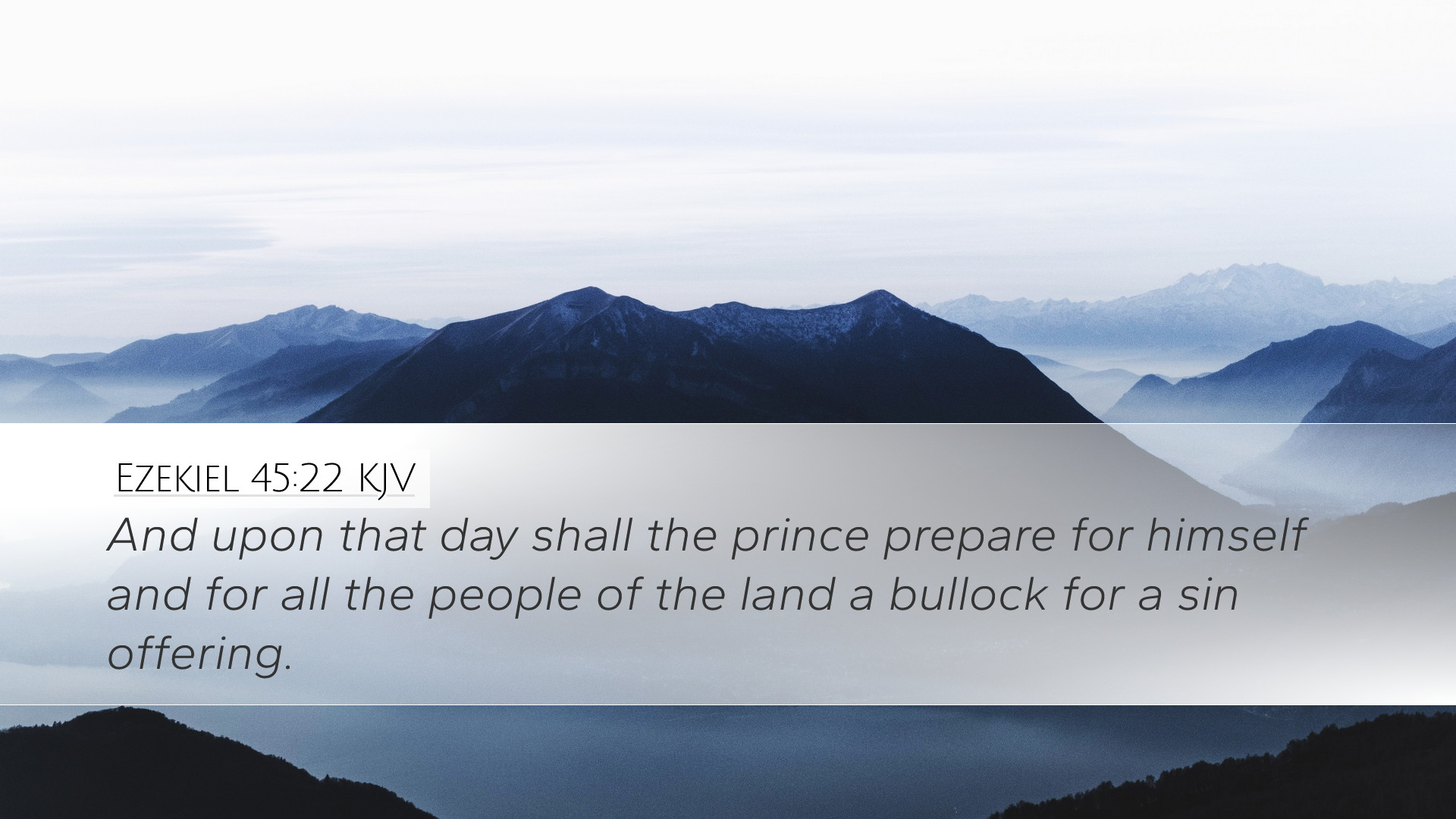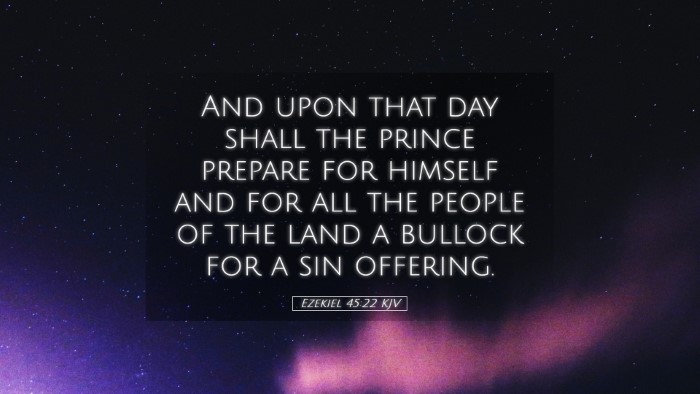Ezekiel 45:22 Commentary
Bible Verse: "And on that day shall the prince prepare for himself and for all the people of the land a bullock for a sin offering."
Introduction
This verse is situated within the prophetic visions of Ezekiel, particularly concerning the restoration of Israel and the establishment of a new temple. The focus here is on the role of the prince in making provisions for the sacrificial system, which serves both a symbolic and practical function in the revival of worship among the people of God.
The Role of the Prince
The term "prince" in the context of Ezekiel's vision refers to a leader or a kingly figure. As Matthew Henry notes, this prince represents an idealized leadership that acknowledges God’s sovereignty and participates actively in the worship of the one true God.
Albert Barnes emphasizes that this leadership is essential in mediating between the people and God, whereby the prince's actions reflect a communal responsibility for sin and atonement. This role is imbued with both authority and humility, as the prince is required to offer sacrifices first for himself and then for the people, highlighting the need for personal repentance before communal representation.
Sin Offerings in the Context of the Hebrew Religion
Ezekiel's mention of a "bullock for a sin offering" reflects the common sacrificial practices specified in the Mosaic Law. The bullock, being a significant sacrifice, underscores the gravity of sin and the necessity for atonement. Adam Clarke elaborates on this by reminding readers that sin offerings were vital in the atonement rituals, signifying the seriousness with which sin was to be addressed within the covenant community.
- Symbolism of the Bullock: The bullock represents strength and submission, mirroring the character of Israel’s relationship with God—strong yet in need of surrender and reconciliation.
- Communal Atonement: The offerings made by the prince are not just personal, but they signify a corporate acknowledgment of sin, which demands the community’s active engagement in worship and atonement.
Theological Implications
This verse has profound theological implications regarding sin, leadership, and communal worship. The presence of sin offerings underlines humanity's need for redemption, which is echoed throughout Scripture. Furthermore, the prince’s role exemplifies the ideal of a leader who is deeply interwoven with the spiritual life of the people.
Matthew Henry asserts that true leadership in godliness requires an awareness that leaders are also sinners in need of God’s grace. This underscores a hierarchical but inclusive nature of worship where the leaders guide the congregation in repentance and celebration of God’s mercy.
Similarly, Albert Barnes provides insight into the communal nature of the sacrifices, stating that they draw together both the leader and the people in a shared experience of reliance on divine forgiveness. This communal aspect of worship emphasizes that individuals cannot stand in isolation from each other in their spiritual lives.
Practical Applications for Today’s Believers
For modern pastors, students, and theologians, this verse serves as a reminder of the importance of humility in leadership. Just as the prince was to offer sacrifices for his sins, today’s leaders in the church must cultivate a spirit of repentance and accountability. This prioritizes personal holiness as a foundation for guiding others in faith.
- Repentance: The call to offer sin offerings encourages a regular practice of confession and repentance within church communities, promoting spiritual health and communal integrity.
- Leadership as Service: The role of the prince reminds church leaders to view their responsibilities as a service to the community, embodying the servant leadership modeled by Christ.
- Community and Worship: A reminder that worship is communal and involves active participation and acknowledgment of sin, fostering a culture where accountability and support are the norms.
Conclusion
Ezekiel 45:22 captures a moment of transition for the people of Israel as they prepare for a restored relationship with God facilitated by covenant leaders. This verse helps us understand the weight of leadership, the necessity of atonement, and the communal aspects of worship. The implications extend beyond the original context into contemporary faith communities, beckoning believers to a renewed vision of leadership, repentance, and collective worship that draws nearer to God through Christ's ultimate sacrifice.


